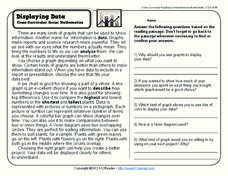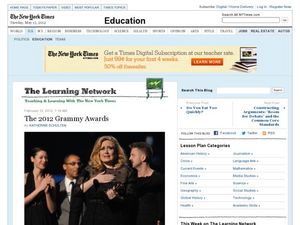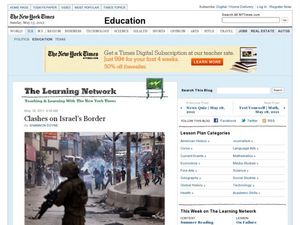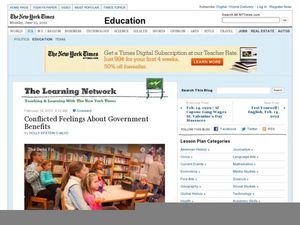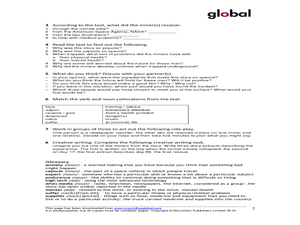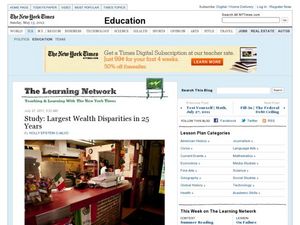Curated OER
America: The Story of Us Episode 6: The Heartland
I love handouts that include reading passages and discussion questions.Here you will find two pages. Page one provides an informational reading passage and six discussion questions. Page two provides a three paragraph primary-source...
Mr. Nussbaum
Battle of Fort Sumter
Fort Sumter, the site of the Civil War's first battle, taught the Union and the Confederacy an important lesson: they would both need to take stronger steps than anticipated if they wanted to win the war. History pupils read about the...
K12 Reader
Displaying Data
It's important to learn how to display data to make the information easier for people to understand. A reading activity prompts kids to use context clues to answer five comprehension questions after reading several paragraphs about...
Curated OER
The 2012 Grammy Awards
Kids answer 11 who, what, when, where, and why questions after reading a New York Times article about the Grammy Awards. Boosting reading comprehension by reading about a topical event keeps pupils informed and interested. A related blog...
Curated OER
The Value of Facebook
Does Facebook actually have any value? Find out what the New York Times thinks by reading this informational article. Learners use the 10 guiding questions to aid them as the read the provided article regarding the value of Facebook. Two...
Curated OER
Qaddafi Is Dead in Libya
The New York Times posted an article titled, "Qaddafi Is Dead in Libya" back in 2011. Your class gets a chance to read that article to better understand current events and increase their reading comprehension. After reading the article,...
Curated OER
Israel and Hamas Agree to Swap Prisoners for Soldier
Put a highly topical reading assignment in your learners grasp. They examine an article discussing the trade of Israeli prisoners for a soldier. The article goes into several facets of the Palestinian-Israeli conflict and a specific...
Curated OER
A 'Stone of Hope'
Kids uncover the who, what, when, where, and why regarding the dedication of the Martin Luther King National Memorial. They read the provided New York Times article and then answer each of the 10 comprehension questions.
Curated OER
Checking the Boxes
Checking boxes on any admissions application is par for the corse. How much does race selections factor into admissions decisions? Kids read a New York Times article on the topic and then answer seven who, what, when, where, and why...
Curated OER
Lin at Home and Abroad
What is so amazing about Jeremy Lin? Read the following New York Times article and find out. The article and 13 comprehension questions regarding this basketball super star are awaiting your eager readers.
Laboratory for Atmospheric and Space Physics
The Planets and Scale
Scholars gain an insight into the relative size of planets and distance between inner and outer planets with the help of informational text, a data table, and a series of four questions.
Curated OER
Reading Comprehension 1
Bring this non-fiction text into your eleventh and twelfth grade classrooms. Your high schoolers will read the long passage provided, and use the information to complete eight multiple-choice questions. The answer sheet details where one...
Curated OER
Identifying Text Features of a Self-Written Fable
Make learning the parts of a book fun by having pupils construct their own glossary entries, table of contents, and title page. Beginning with a review of text features and a hunt for examples, kids use previously written fables to...
Curated OER
Clashes on Israel's Border
Here are 11 questions intended to guide learners as they read a New York Times article about the violence and conflict between Israel and Palestine. They can review the questions and then read the article to help answer them. A link to a...
Curated OER
Earthquake Strikes Virginia
In August of 2011 an earthquake shook the nation's capitol, and became a newsworthy event; learners read this New York Times article to find out why. They read the piece then answer nine related comprehension questions. Two additional...
Curated OER
In Legal Limbo
Newspapers are great learning tools. They act as a conduit for current events, reading comprehension, and critical thinking. Here, pupils read a New York Times article regarding US immigration law under the Obama administration and...
Curated OER
Conflicted Feelings About Government Benefits
Government spending on social programs in the US is a big topic. It is also the current event kids will read about as they delve into this issue of the New York Times. They'll read the article, then answer seven comprehension questions....
Humanities Texas
Primary Source Worksheet: Tip O'Neill, "Epilogue: What I Believe" from Man of the House
The epilogue to former Speaker of the House Tip O'Neill's memoir provides readers with an opportunity to practice their informational text reading comprehension skills.
Curated OER
Where in the World is Mrs. Waffenschmidt? #11
Boats, gondolas, and narrow canals! Sounds like Mrs. Waffenschmidt is hanging out in Venice, Italy. Your class needs to read the informational paragraph and use what they know about geography and culture to determine this mysterious...
Curated OER
Where in the World in Mrs. Waffenschmidt? #3
Not only does the class need to find out where Mrs. Waffenschmidt is, they need to name the famous author from that country. They read the informational passage, use the clues given, and determine the author's name and the teacher's...
K5 Learning
May the Best Prankster Win
Everyone loves a good prank! With this reading passage, Perla and her grandmother play some fun innocent pranks on one another. Kids focus on new vocabulary words, questions about the information they have read, and responding with their...
Curated OER
Freedom for the Chilean Miners
Have your class read this seven paragraph article about Chilean miners who were trapped and freed from a mine. There are five comprehension questions, a verb-to-noun matching exercise, a role-play suggestion, and a creative writing task...
Curated OER
The Arab-Israeli Conflict
Provide your class with a context and series of events that has led to the conflict in the Middle East. They read 4 separate passages and answer 1 critical thinking question for each. Four more questions are posed at the bottom of the...
Curated OER
Study: Largest Wealth Disparities in 25 Years
The New York Times has produced an article specifically geared to its younger readers. They read an article entitled, "Largest Wealth Disparities in 25 Years" to answer six comprehension questions. They'll be asked who, what, where,...


